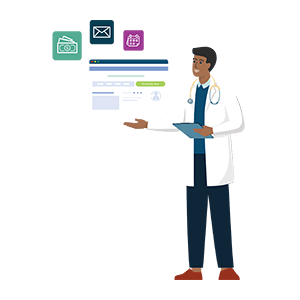How Top-Earning Cardiologists Are Scheduling More Patients to Boost Profits

Updated by Blakely Roth | June 20, 2024
There is transformative potential for patient self-scheduling specifically tailored to cardiology practices.
In a survey, a staggering 82% of patients expressed a strong preference for providers who offer online scheduling. Gone are the days of waiting on hold, playing phone tag, or navigating complex scheduling processes. The modern patient seeks efficiency and control, and by embracing automated self-scheduling, you tap into this desire in a way that enables your practice to book more patients than ever before.
Keep reading to learn how top-earning cardiologists are scheduling more patients and boosting profits with a smart patient scheduling platform.
The Unique Demands of Cardiology Scheduling
Cardiology appointments come with their own set of intricacies, often involving specialized diagnostic tests, complex procedures and varying appointment durations.
Unlike standard healthcare visits, cardiology patients may require specific preparations or follow-up appointments, making the scheduling process more intricate. As a result, traditional scheduling methods struggle to accommodate the diverse needs of cardiology patients, leading to inefficiencies and potential patient dissatisfaction.
Timely access to cardiology care is critical for patient outcomes. Any delays or missed appointments can hinder the timely diagnosis and treatment of cardiovascular conditions, leading to worsening health conditions for patients. A concerning statistic reveals that 61% of patients have skipped appointments due to various scheduling challenges, including being directed to schedule appointments via a traditional phone call. Difficulties in finding the right time, changing appointments and long call hold times can all lead to patient frustration and missed appointments that can be harmful to their health and your patient acquisition rates.
Many physicians approach online or patient self-scheduling with caution, primarily due to apprehensions about inaccurate appointment bookings. This hesitation stems from concerns that the specifics of scheduling might not be appropriately handled with a smart self-scheduling solution. Ensuring appointments are booked correctly is a vital aspect of any medical practice. They fear that automated scheduling tools may not comply with their complex booking requirements, leading to inaccuracies in how patients are booked.
To counter this concern, it’s essential to emphasize the capabilities of proven patient self-scheduling platforms. Smart patient self-scheduling tools are designed to meet the intricate scheduling requirements of all specialty healthcare practices, including cardiology, while ensuring that patients book their appointments accurately each time.
One director of operations of a specialty practice shares, “Our online scheduler has been huge in helping book patients in a way that meets provider requirements, and now it is really on autopilot for us. It has been so seamless and a great convenience for our patients and relief for our staff.” That practice was able to meet the complex scheduling requirements of their 26 physicians on staff, you can read their full story here.
The benefit of automated online patient scheduling software is that it can’t veer away from your pre-determined scheduling requirements, which is something you can’t always guarantee with staff booking appointments over the phone.
Unlike the uncertainties associated with over-the-phone interactions, which might lead to miscommunications and missteps due to the limitations of human interactions, a dedicated patient scheduling solution is built with precision. It adheres to the defined scheduling workflows, leaving minimal room for errors. These tools leverage a deep understanding of the intricacies associated with different medical specialties and can be built to match your cardiology practice’s complex requirements, no matter how difficult. They are equipped with features that cater to the specific rules of individual providers, practice compliance necessities and the overall best practices in patient scheduling. This assurance can significantly enhance a physician’s confidence in embracing online scheduling solutions while helping them book more patients!
Empowering Cardiology Patients with Self-Scheduling
Patient self-scheduling is a new way of booking medical appointments that puts patients in control. Instead of relying on doctors or staff to set up appointments, patients can use an online platform to see available time slots in real-time, right from your website. They can then choose a time that works best for them, add their insurance to ensure they’re covered and book the appointment themselves.
A proven, and automated patient self-scheduling platform also allows patients to reschedule or cancel appointments if needed, all at their convenience. This patient-centered approach makes scheduling easier and empowers patients to take an active role in managing their healthcare.
Patientself-scheduling for cardiology practices can be designed to fit the specific needs of cardiology appointments. It can be customized to handle different types of appointments, such as diagnostic tests, follow-ups, consultations, and linked appointments. By including special instructions before the appointment, cardiology practices can make sure the booking process is smooth and meets the diverse needs of their patients.
Self-scheduling gives cardiology patients more control over their healthcare. They can use a user-friendly online platform to see available appointment times in real time and choose the one that works best for them. This means less waiting and more flexibility to plan their cardiology visits according to their preferences and schedule.
Enhancing Profits and Patient Care in Cardiology
Patient self-scheduling is not only beneficial for patients but also proves to be a game-changer for cardiology practices in terms of profits and patient care. With patient self-scheduling, patients are more likely to keep their appointments because they have actively chosen the time that suits them best. This reduces the number of cancellations and no-shows, allowing cardiologists’ schedules to be more consistent and avoid gaps in patient care.
By allowing patients to schedule their own appointments, cardiology practices can also better manage their resources and staff.. The streamlined scheduling process helps to reduce the staff burden of managing over-the-phone scheduling. Consider after a holiday or on a Monday, how busy are your phone lines? If you could divert some of that traffic to an online scheduler, you save your staff time to answer other patient calls and focus on in-office work. One practice sees 84% of online booked appointments made by existing patients and 55% of online booked appointments happen during business hours. This is traffic that your staff doesn’t have to intervene with, saving them time while keeping patients on your schedule.
This optimized resource management not only enhances patient care but also contributes to a more cost-effective operation.
Patient self-scheduling, in addition to its operational advantages, has the potential to significantly increase patient acquisition. Offering patients the ability to book their appointments at their convenience empowers them and meets their expectations for modern healthcare services. Practices can see upwards of 45% of online appointment booking happen after hours while 34% happens at the last minute, both of which help you ensure patients book at your practice, instead of looking elsewhere. Of those results the Director of Operations shares, “If we didn’t have the online, 24/7 option, we would not otherwise capture those patients. So, I am very pleased with the after-hours numbers!”
This convenience and flexibility becomes a competitive advantage, attracting new patients to the cardiology practice who might have hesitated with traditional scheduling methods. As a result, cardiology practices witness a noticeable uptick in patient volume, translating into higher revenue and a healthier financial outlook for the practice.
The growth in patient numbers through self-scheduling creates opportunities for building lasting patient relationships. As these new patients experience the ease of booking appointments, they become more likely to engage with the practice for additional services, screenings or preventive care. This potential upselling of services not only enhances patient care but also adds to the practice’s profitability.
Proactive Appointment Management: Leveraging Waitlists in Cardiology
Waitlists can be a helpful tool for cardiology practices to manage their appointments more efficiently. When combined with smart patient scheduling software, waitlists automatically create a list of patients interested in specific appointment types, providers and preferred timeframes. This reduces idle time by filling last-minute openings and avoiding gaps in the schedule.
For cardiology patients, waitlists offer a valuable solution, especially when they struggle to find suitable appointment options. Patients can join the practice’s waitlist based on their specific needs and preferences. The intelligent waitlist platform will automatically notify patients about available slots that match what they’re looking for. This helps improve patient experience and access to care, while you maximize provider schedules.
Using an automated waitlist helps your practice better address appointment cancellations and rescheduled appointments. When last-minute slots become available, the next patient on the waitlist for that specific appointment type will get an automated text message about the opening. Patients can confirm their appointments quickly, and the platform will book their appointments without any staff involvement. This proactive approach shortens wait times, making it easier for patients to see a practitioner promptly, which is especially important since the patient perception of “seeing a practitioner quickly” as the biggest access challenge rose from 15% in 2020 to 27% in 2022. By leveraging waitlists, cardiology practices can ensure that appointment slots are used effectively, benefiting both patients and the practice.
Revolutionizing Cardiology Care through Patient-Centric Scheduling
The implementation of patient self-scheduling platforms in cardiology practices offers tailored advantages that directly address the unique demands of this specialized field. By empowering patients with greater control over their healthcare journey, cardiology practices can bring in more patients, optimize clinic resources and maximize cardiologist schedules.
Embracing innovative scheduling methods, such as patient self-scheduling and leveraging waitlists, proves essential for sustaining growth and success in the field of cardiology. Embracing a patient-centric approach fosters better patient outcomes and sets the stage for continued advancements in the industry.
If you’re ready to take your cardiology practice to the next level and discover the strategies to book more patients than ever before, download our exclusive webinar: “The Key to Booking More Patients Than Ever Before.” In this webinar, you’ll gain insights from industry experts and learn how to implement patient self-scheduling effectively, along with other essential strategies for practice growth.
Recommended for you
Related Posts
How to Increase Dermatology Patients & Profits With an Online Scheduling Platform
Reading Time: 4 minutes By Chloe From Clearwave | October 21, 2024 Picture this: A patient notices an unusual mole after returning home from…
3 Tips For Using Self-Scheduling to Boost Patient Acquisition in Healthcare
Reading Time: 4 minutes By Chloe From Clearwave | October 7, 2024 In a time when convenience is king, healthcare practices are turning to…
3 Creative Ways to Increase Patient Volume
Reading Time: 4 minutes By Blakely Roth | September 4, 2024 Increasing patient acquisition while facing rising healthcare costs, staffing shortages, Medicare payment reductions…




